Domestic Battery Meaning: What it Means and What You Need to Know
Domestic Battery Meaning: What it Means and What You Need to Know
Domestic battery is when someone purposefully or deliberately touches a family member or household member or spills body fluids or waste on them in a harsh, angry, or disrespectful manner.
It is a serious crime in California that can lead to severe legal consequences. If you’re accused of domestic battery, you may face jail time, fines, and a criminal record that can impact your future.
You might be wondering, “What exactly constitutes domestic battery under California law, and how can I defend myself against these charges?” This post will provide a comprehensive overview of California’s domestic battery laws under Penal Code 243(e)(1), including the legal definition, penalties, and potential defenses.
The Crime of Domestic Battery in California - PC 243(e)(1)
Domestic battery is a serious offense in California, defined under Penal Code 243(e)(1). Understanding the legal definition and elements of this crime is crucial if you or a loved one have been accused of domestic battery.
What is Domestic Battery Meaning per California Penal Code 243e1?
Domestic battery under PC 243(e)(1) involves the willful and unlawful use of force or violence against an intimate partner. To be convicted, the prosecution must prove two key elements:
You willfully touched the victim in a harmful or offensive manner. The victim is your current or former spouse, cohabitant, fiancé(e), co-parent, or someone with whom you have or had a dating relationship.
Examples of Domestic Battery
Domestic battery can take many forms, even if no injury occurs. Examples include:
- Grabbing your partner’s wrists in a harsh manner during an argument
- Pushing or shoving your partner out of anger
- Slapping or striking your partner, even if it doesn’t leave a mark
- Throwing an object at your partner or damaging their property
The key is that the physical contact was willful and done in a disrespectful or angry manner, regardless of whether it caused pain or visible injury.
Request a Free Consultation
The Difference Between Domestic Violence and Battery
While often used interchangeably, domestic violence and battery are distinct concepts under California law. Domestic violence refers to a broader category of abusive conduct, while battery is a specific criminal offense.
Separating Battery from Domestic Battery
Battery (PC 242) is defined as any willful and unlawful use of force or violence against another person. Domestic battery (PC 243(e)(1)) is a specific type of battery committed against an intimate partner.
Key differences include:
- Battery can be charged for force used against anyone, while domestic battery requires the victim to be an intimate partner.
- Domestic battery carries additional penalties and consequences, such as mandatory domestic violence classes and loss of gun rights.
Reduction to Lesser Crimes
In some cases, a domestic battery charge may be reduced to a lesser offense, such as:
- Simple battery (PC 242)
- Disturbing the peace (PC 415)
- Trespassing (PC 602)
- Factors that may lead to a reduction include:
- Insufficient evidence of the intimate relationship
- Lack of corroborating evidence
- Victim’s unwillingness to cooperate with prosecution
- Completion of anger management or domestic violence classes by the defendant
An experienced criminal defense attorney can evaluate the specific facts of a case to determine if a reduction to a lesser charge is possible.
What are the Penalties for Domestic Battery?
In California, domestic battery is typically charged as a misdemeanor offense under Penal Code 243(e)(1). If convicted, you could face up to one year in county jail, a fine of up to $2,000, or both.
The court may also order you to complete a batterer’s intervention program or other counseling, and you may be subject to a restraining order prohibiting contact with the victim.
In addition to these criminal penalties, a domestic battery conviction can have far-reaching consequences.
You may lose custody or visitation rights with your children, face difficulties finding employment or housing, and have a permanent criminal record that follows you for life.
Legal Defenses Against Domestic Battery Charges
If you’ve been accused of domestic battery, several legal defenses may be available depending on the circumstances of your case. An experienced criminal defense attorney can help you determine the best strategy.
Self-Defense or Defense of Others
If you were acting to protect yourself or someone else from imminent harm, you may have a valid self-defense claim. To succeed with this defense, you’ll need to show that you reasonably believed you or another person was in immediate danger and that the force you used was necessary to prevent that harm.
Lack of Intent or Accident
Domestic battery requires willful, intentional touching. If the contact was accidental or you didn’t intend to cause harm, this could be a defense. For example, if you accidentally bumped into your partner during an argument, causing them to fall, you may be able to argue that the touching was unintentional.
False Accusations
Unfortunately, false allegations of domestic violence are not uncommon, particularly in contentious divorce or child custody cases. If the accuser is lying or exaggerating, your attorney can work to expose inconsistencies in their story and gather evidence to support your innocence, such as witness statements or electronic communications.

As Seen On












History of Success Defending Domestic Battery Cases With Huff Legal
At Huff Legal, we have a proven track record of successfully defending clients against domestic battery charges. With over 155 years of combined experience in criminal law, our team has the knowledge and skills to navigate these complex cases.
While we cannot promise a specific outcome, we can assure you that we will work tirelessly to achieve the best possible result, whether that means fighting for an acquittal at trial, negotiating a favorable plea deal, or getting the charges dismissed altogether.
With over 1,500 satisfied clients and a 5-star rating on Google, you can trust Huff Legal to provide the aggressive, compassionate representation you need during this challenging time.
FAQ
What are domestic batteries?
Domestic batteries refer to battery-powered devices used in the home, such as home energy storage systems, smoke detectors, and remote controls. These batteries are designed for residential applications and are typically rechargeable.
What does battery mean in crime?
In criminal law, battery is defined as the illegal and deliberate application of force or violence against another individual, resulting in harmful or offensive physical contact. Battery is distinct from assault, which involves the threat of violence rather than the actual use of force.
In criminal law, battery is defined as the illegal and deliberate application of force or violence against another individual, resulting in harmful or offensive physical contact. Battery is distinct from assault, which involves the threat of violence rather than the actual use of force.
What does domestic battery mean in WV?
According to West Virginia Penal Code § 207(a), domestic battery involves the illegal and intentional act of making physical contact in a manner that is insulting or provoking with a family or household member or deliberately causing them physical harm. This definition encompasses current or former spouses, cohabitants, and other intimate partners.
What is the difference between assault and battery?
The main difference between assault and battery is that assault involves the threat of violence and creating a reasonable fear of imminent harm, while battery involves the actual use of unlawful force or physical contact, even if it does not result in injury. Assault is often considered an attempted battery.
What Clients Say About Us





Schedule Your Free Consultation Today
If you or someone you know is facing Domestic Battery Charges, it is crucial to consult with a qualified criminal defense attorney who can provide personalized legal advice based on the specific circumstances of the case. They can help navigate the legal process, protect your rights, and provide guidance on the potential penalties you may face.
Hiring a competent and knowledgeable criminal defense attorney in the San Francisco Bay Area who can represent you in court is essential to defending yourself and preserving your future. Our Bay Area Accessory to Domestic Battery Lawyers at Huff Legal can use various strategies for the best possible outcome of your case.
LET HUFF HELP YOU
As a former police officer and patrol supervisor and his time spent as a United States District Court Judicial Law Clerk to the Chief Judge, Attorney Huff knows how to navigate all levels of the complex criminal law system. We also have more than 55 years of combined experience dealing with various complex criminal legal matters and have helped just over 1,500 clients over the past few years.
Why Huff Is Your Best Option For Criminal Defense
55+ Years of Combined Experience
At Huff Legal, we have more than 55 years of combined experience dealing with complex criminal legal matters, which can oftentimes be quite challenging. In order to get the outcome you deserve, you need a team of experienced attorneys on your side, who can help you navigate the legal system, so you can move past this situation and focus on the life ahead of you!
5 Star Rating on Google
We have a proven track record of success and are dedicated to our clients’ best interests. If you’re looking for a law firm that will always have your back, look no further than Huff Legal. Just have a look at some of our amazing client reviews over here!
1,500+ Happy Clients
Over the years, we’ve had the privilege of helping over 1,500 clients with their legal needs. When you work with us, you can be confident that you’re getting the best possible legal representation. We’re proud of our track record and our reputation for being a firm that delivers great results.
What Our Clients Say About Us


Sheila


Abel Resendiz


Manuela Frazier


Doris
Contact Huff Today
Request A Free Consultation
* Free consultations only available for Criminal Defense


In legal terms, an accessory to murder refers to an individual who aids, abets, or otherwise assists in committing a murder. While the specifics may vary across jurisdictions, California law treats accessories to murder as active participants in the crime, holding them accountable for their actions. In San Francisco Bay Area, there are two primary types of accessories to murder:
In the event that you find yourself in the Bay Area facing accessory to murder charges, you should first call a criminal defense attorney who can help you defend your rights and lessen the effects of the investigation. Contact an attorney at Huff Legal as soon as possible following your arrest. An accomplished attorney from Huff Legal will thoroughly examine your case, who will then develop a strategy and build a defense.
